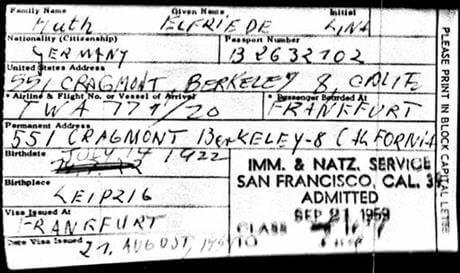Watchdog finds ex-Nazis got $20.2 million in Social Security
WASHINGTON - Agence France-Presse

AP Photo
Elfriede Rinkel's past as a Nazi concentration camp guard didn't keep her from collecting nearly $120,000 in American Social Security benefits.
Rinkel admitted to being stationed at the Ravensbrueck camp during World War II, where she worked with an attack dog trained by the SS, according to US Justice Department records. She immigrated to California and married a German-born Jew whose parents had been killed in the Holocaust.
She agreed to leave the US in 2006 and remains the only woman the Justice Department's Nazi-hunting unit ever initiated deportation proceedings against. Yet after Rinkel departed, the US Social Security Administration kept paying her widow benefits, which began after her husband died, because there was no legal basis for stopping them until late last year.
Rinkel is among 133 suspected Nazi war criminals, SS guards, and others that may have participated in the Third Reich's atrocities who received $20.2 million in Social Security benefits, according to a report to be released later this week by the inspector general of the Social Security Administration. The Associated Press obtained a copy of the report.
The payments are far greater than previously estimated and occurred between February 1962 and January 2015, when a new law called the No Social Security for Nazis Act kicked in and ended retirement payments for four beneficiaries. The report does not include the names of any Nazi suspects who received benefits. But the descriptions of several of the beneficiaries match legal records detailing Rinkel's case and others.
The large amount of the benefits and their duration illustrate how unaware the American public was of the influx of Nazi persecutors into the U.S., with estimates ranging as high as 10,000. Many lied about their Nazi pasts to get into the U.S. and even became American citizens. They got jobs and said little about what they did during the war.
Americans were shocked in the 1970s to learn their former enemies were living next door. Yet the US was slow to react. It wasn't until 1979 that a special Nazi-hunting unit, the Office of Special Investigations, was created within the Justice Department.
Democratic Rep. Carolyn Maloney requested that the Social Security Administration's inspector general look into the scope of the payments following an AP investigation, which was published in October 2014.
AP found that the Justice Department used a legal loophole to persuade Nazi suspects to leave the US in exchange for Social Security benefits. If they agreed to go voluntarily, or simply fled the country before being deported, they could keep their benefits. The Justice Department denied using Social Security payments as a way to expel former Nazis.
By March 1999, 28 suspected Nazi criminals had collected $1.5 million in Social Security payments after their removal from the US, Social Security Administration records uncovered by AP showed. Since then, AP estimated the amount paid out had grown substantially. That estimate was based on the number of suspects who qualified and the three decades that have passed since the first former Nazis, Arthur Rudolph and John Avdzej, signed agreements that required them to leave the country but ensured their benefits would continue.
Maloney, a senior member of the House Oversight and Government Reform Committee, said the IG's report showed that dozens of alleged and confirmed Nazis actively worked to conceal their true identities from the US government and still received Social Security payments.
"We must continue working to remember the tragedy of the Holocaust and hold those responsible accountable," Maloney said. "One way to do that is by providing as much information to the public as possible. This report hopefully provides some clarity."
The inspector general's report used computer-processed data and other internal agency records to develop a comprehensive picture of the total number of Nazi suspects who received benefits and the dollar amounts paid out. The Social Security Administration last year refused AP's request for those figures.
The report said $5.6 million was paid to 38 former Nazis before they were deported. Ninety-five Nazi suspects who were not deported but were alleged or found to have participated in the Nazi persecution received $14.5 million in benefits, according to the report.
The IG criticized the Social Security Administration for improperly paying four beneficiaries $15,658 because it did not suspend the benefits in time. The agency "properly stopped payment" to the four beneficiaries when the new law banning benefits to Nazi suspects went into effect. The agency did, however, continue payments to one suspect because he was not subject to the law.
The Social Security Administration did not respond to a request for comment.
But in informal comments to the IG, the agency and the Justice Department said the pool of 133 suspects included individuals who were not deported and may not have had any role with the Nazis. The Justice Department requested that the report only include the names of 81 people it had provided to the IG. The department said those individuals had conclusively been determined to be involved in the Nazi persecution.
Rinkel was deported to Germany in 2006. AP could not locate her, although she is believed to be alive. She would be 92. Before she left the US, Rinkel said she never told her husband of four decades about her past as a concentration camp guard.
The IG's report also describes a beneficiary who worked as a guard at several Nazi concentration camps and left the U.S. in 1989 after learning the Justice Department planned to strip him of his citizenship. The beneficiary received nearly $400,000 in Social Security until the payments were terminated in January when the new law went into effect.
The details match the case of Jakob Denzinger, a successful plastics industry executive in Akron, Ohio. Denzinger's US citizenship was revoked a few months after he departed. Denzinger's son, Thomas Denzinger, said Sunday his father is living in Croatia but suffers from congestive heart failure and near blindness. "His end is near," he said.
He said his father was entitled to the benefits after paying Social Security taxes for 33 years. "He's never been convicted of anything," Thomas Denzinger said.
Efraim Zuroff, the head Nazi hunter at the Simon Wiesenthal Center in Jerusalem, said the Justice Department did what was necessary to get Nazi suspects out of the US But "it's a travesty," he added, that so many of them ended up keeping their benefits.
"The issue is the principle here - do you sign deals with Nazis to get them out of the country?" he said May 31. "The Department of Justice said yes, but who wants to think that taxpayer dollars went to people who served as guards in camps? On the other hand, the government was trying to maximize what it could do with the tools that they had."

